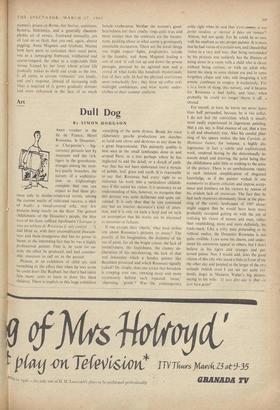Art
Dull Dog
Ily SIMON HODGSON
APRIL weather in the Ile de France,. Henri Rousseau, 'le Douanier,' at Charpentier's -- big- currency pictures lent by museums and the rich, tigers in the greenhouse, oranges among the mon- key-puzzle branches, the naivety of a sophistica- tion so frighteningly complete that one can expect to find these pic-
tures only in double-windowed rooms, among the current marks of cultivated success, a stick
of bonne, a tweed-covered sofa, very few
pictures hung nearly on the floor: The genteel childishness of the Douanier's people, the blue
eyes of his lions, sufficed Apollinaire CLorsque ie roil nn tableau de Rousseau je mils contot . .
and blind us, with their uncomplicated pleasant- ness and the'w strangeness that has no power to haunt, to the interesting fact that he was a highly Professional painter. That is, he went for ex- actly the effect he produced, and had consider- able resources to call on in the pursuit.
Picasso, at an exhibition of child art, said something to the effect that when he was seven he could draw like Raphael. but that it had taken him many years to learn to draw like these children. There is implicit in this huge exhibition something of the same slyness. Beside his most elaborately gauche productions are sketches as lucid and clever and dextrous as any done by a great Impressionist. This painterly quality is best seen in the small landscapes done in and arourid Paris, in a tree perhaps where he has neglected to add the detail, or a sketch of path- way that has not been elaborated into a mosaic of pebble, leaf, grass and earth. It is reasonable to say that Rousseau had every right to so elaborate his work into a meticulous childish- ness if this suited his vision; it is necessary to an understanding of him, however, to recognise that this process was quite deliberate and quite cal- culated. It is only thus that he can command any but an interior decorator's kind of atten- tion, and it is only on such a level and on such an assumption that his works can be discussed as successes or failures.
If one excepts their 'charm,' what most strikes one about Rousseau's pictures en masse? The paucity of his imagination, the drabness of his use of paint, for all the bright colour, the lack of inventiveness, the loutishness, the clumsy de- liberation of his mis-drawing, the lack of that real innocence which a Sunday painter like Bauchant possessed and which Rousseau signally lacked? Or, simply, does one notice that boredom is creeping over one, yawning more and more cavernously behind each repeated 'sweet,' 'eharming,"gentle'? Was the contemporary critic right when he said that 'c'est romme si une petite modiste se mettait a faire on roman'? Almost, but not quite. For he could be as easy with his medium as any proper painter. It is more that he had vision of a certain sort, and chased that vision in a very dull way; that being surrounded by his pictures one suddenly has the illusion of being alone in a room with a child who is clever without being curious, or with an adult who learnt his slang in some distant era and in some forgotten clique and who, still imagining it will amuse, continues to employ it exclusively. For it is a form of slang, this naivety, and it became for Rousseau a bad habit, and later, when probably he could no longer throw it off, a shroud.
For myself, at least, he leaves me never more than half persuaded, because he is too artful. I do not feel the conviction, which is usually most easily experienced in ingenuous painting. that a cat, say, is final essence of cat, that a tree is all and absolutely tree. Also his careful plan- ' ning of his spaces makes the late Carriole de Monsieur .1 unit«, for instance, a highly dis- ingenuous, in fact a subtle and sophisticated. work, rendered boring by the determinedly in- nocent detail and drawing, the point being that the childishness adds little or nothing to the sense of the picture. There is an unwholesome vanity in such insistent simplification of disguised knowledge, as if the painter wished in one manoeuvre to disarm criticism and impose accep- tance and kindness on his viewers by reason of his evident lack of resources. The fact that he had such resources abundantly (look at the plan- ning of the exotic landscapes of 1907 alone) might suggest that he w ould have been more profitably occupied getting on with the job of realising his vision of nature and man, rather than establishing, more and more definitely, his trade-mark. Like a witty man pretending to be without malice, the Douanier Rousseau is not quite credible. I can sense his charm, and under- stand his enormous appeal to others, but I don't believe in his tigers and oranges and pat- terned palms. Nor, I would add, does the good citizen of this city who stood a little in front of me the other day and pointed at the larger of the two
animals (which even I can see arc quite evi- dently dogs) in Madame Walter's big picture.
saying to his wife; Jam dire clue le chat eq fort hien paint!'






































 Previous page
Previous page